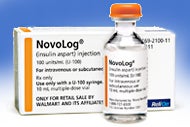

Walmart Is Rolling Back Prices . . . This Time on Insulin
 As patients and politicians continue searching for remedies to soaring insulin prices for diabetes patients, Walmart recently launched the first private-label version of the drug at less than half the price of brand-name versions.
As patients and politicians continue searching for remedies to soaring insulin prices for diabetes patients, Walmart recently launched the first private-label version of the drug at less than half the price of brand-name versions.
Walmart pharmacies have begun filling prescriptions for its ReliOn NovoLog brand of insulin in vials and injector pens. The drug, made by Novo Nordisk, will be available in Sam’s Club wholesale stores midmonth.
Vials will retail for about $73 and injector pens for $86 — saving consumers between 58% and 75% on similar products from manufacturers like Eli Lily and Sanofi, whose sales figures for the drugs have ballooned due to rising prices in recent years.
The move is yet another example of expanding Walmart’s “everyday low pricing” strategy to its health care products and services. The retailer had already been selling a $25 version of insulin, but it is an older formulation that some doctors and advocates argue is not as effective in managing blood sugars as newer versions, known as analogs.
Intervening to reduce drug prices is also part of Walmart’s larger disruption strategy in health care. The company has made major investments recently to provide virtual care services throughout the country, including urgent care, behavioral health and primary care. As part of those efforts, Walmart has agreed to buy telehealth provider MeMD.
Nearly 11% of the U.S. population has diabetes, according to the American Diabetes Association, and Walmart officials say about 14% of their customers have the disease. The annual cost of insulin for those with type 1 diabetes in the U.S. has soared from $2,900 in 2012 to $5,700 in 2016, according to the most recent data from the Health Care Cost Institute.
That kind of data led politicians to grill insulin manufacturers about the pricing of the drugs and, while manufacturers responded with temporary price relief, no long-term solution surfaced until now. Brand names have faced increasing competition from generic biosimilars in Europe, Barron’s magazine reports, so the three industry leaders sped up their work on new treatments along with extending their metabolic know-how into drugs against obesity, a disease that increases the chance of developing diabetes.



